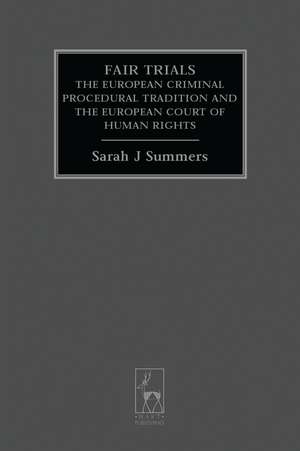Fair Trials: The European Criminal Procedural Tradition and the European Court of Human Rights: Criminal Law Library
Autor Professor Sarah J Summersen Limba Engleză Hardback – 9 aug 2007
Preț: 508.70 lei
Preț vechi: 730.21 lei
-30% Nou
Puncte Express: 763
Preț estimativ în valută:
97.34€ • 102.36$ • 80.43£
97.34€ • 102.36$ • 80.43£
Carte tipărită la comandă
Livrare economică 17 aprilie-01 mai
Preluare comenzi: 021 569.72.76
Specificații
ISBN-13: 9781841137308
ISBN-10: 1841137308
Pagini: 200
Dimensiuni: 156 x 234 x 16 mm
Greutate: 0.41 kg
Editura: Bloomsbury Publishing
Colecția Hart Publishing
Seria Criminal Law Library
Locul publicării:London, United Kingdom
ISBN-10: 1841137308
Pagini: 200
Dimensiuni: 156 x 234 x 16 mm
Greutate: 0.41 kg
Editura: Bloomsbury Publishing
Colecția Hart Publishing
Seria Criminal Law Library
Locul publicării:London, United Kingdom
Caracteristici
This book addresses the issue of the meaning of the right to a fair trial by examining the contemporary jurisprudence in the light of a body of historical literature which discusses criminal procedure in a European context.
Notă biografică
Sarah J Summers is Oberassistentin in criminal law and procedure,at the University of Zurich, Switzerland and a researcher at the Max Planck Institute for Foreign and International Criminal Law in Freiburg i Br, Germany.
Cuprins
Part One1. The Enduring Legacy of 'Inquisitorial' and 'Accusatorial' Procedural Forms in the Debate on Comparative Criminal Procedure AThe Enduring Legacy of the Inquisitorial/Accusatorial Divide BThe Connection to Legal Nationalism CDeveloping a New Approach for Analysing European Criminal Procedure Law 2. The Origins of the European Criminal Procedural Tradition AIntroduction: The Importance of the Developments of the Nineteenth Century BThe Development of the 'Accusatorial Trinity' CJudicial Impartiality (i)The Separation of the Functions of 'Judging' and Prosecuting in France and Germany (ii) Impassivity or Activity: The Role of the English Judge in the Examination of the Evidence (iii) Institutional Impartiality DThe Public Hearing Requirement EImmediate and Oral Proceedings (i) Immediate and Oral Examination of Evidence at Trial (ii) Consideration at Trial of Evidence Collected before the Trial and Submitted in Writing (iii)Immediate and Oral Proceedings as Fundamental to the Accusatorial System FConclusions 3. The Rights of the Defence: Lessons from the Nineteenth Century AThe Institutional Nature of the 'Rights of the Accused' BThe Rights of the Defence at Trial (i)The Presence of the Accused (ii) Participatory Rights of the Accused (a) The Developing Conception of the Accused as a Party (b) Understanding the Nature of the Accused's Participatory Rights: The English Reforms of the Late Nineteenth Century (c) The Assistance of Counsel CThe Role of the Defence in the Pre-trial Phase (i) The Pre-trial Phase as 'Investigative' (a) The Questioning of the Accused (b) The Examination of Evidence (ii)The Determinative Reality of the Investigation DConclusions Part Two4. Defining Fairness in Article 6(1) ECHR AIntroductionBIdentifying Vargha's 'Accusatorial Trinity'CThe Role of the 'Equality of Arms' DoctrineDThe Relationship between the Adversarial Procedure Requirement and the Equality of Arms EThe Court's Interpretation of the Adversarial Procedure Requirement in Criminal Proceedings(i)The Right to be Present at Trial(ii)Knowledge of the Other Side's Submissions(iii)Opportunity to Comment on the Other Side's SubmissionsFThe Relationship between the Defence and the ProsecutionGFairness and Implied Procedural Forms 5. The Structure of the 'Trial' in Article 6 ECHRAIntroductionBThe Defence's Right to Challenge Witness EvidenceCWitness Evidence in Europe: An OverviewDRegulating Witness Evidence: Article 6(3)(d)(i)What is an Adequate and Proper Opportunity to Challenge Witnesses?(a) The Identity of the Witness(b) The Importance of the Witness(ii)When Should Witnesses be Examined? EThe Importance of the Trial as the Forum for Confronting Witness EvidenceFReconciling Examination of Witnesses in the Investigation Phase with the'Accusatorial Trinity' (i)The Presence of Counsel during Pre-trial Examination of Witnesses(ii)The Presence of an Impartial Supervisory Authority during the Examination of Witnesses(iii)ImmediacyG The Privilege Against Self-incrimination (i) Improper Compulsion(ii) Indirect 'Acceptable' Compulsion(iii) The Relationship between Compulsion and the Assistance of Counsel(iv) The Privilege against Self-incrimination as a Substitute for the Refusal to Insist on Adversarial Principles in the Investigation Phase HThe Root of the Problem: Defining the 'Trial'(i)The Investigation Phase Lacuna(ii)Explaining the Investigation Phase Lacuna: Les Travaux Préparatoires(iii)Resolving the Fairness Deficit: Acknowledging the European Procedural Tradition6. Reassessing Fairness in European Criminal Law: Procedural Fairness, Defence Rights and Institutional Forms AProcedural Fairness as Individual RightsBProcedural Rights and Institutional FormsCArticle 6 ECHR and the European Criminal Procedural TraditionDTowards an Institutional Understanding of Fairness in Criminal Proceedings
Recenzii
...essential reading for the thinking criminal lawyer.
Descriere
This book elucidates the meaning of the fair trial and challenges the conventional approach to the analysis of criminal procedure.









